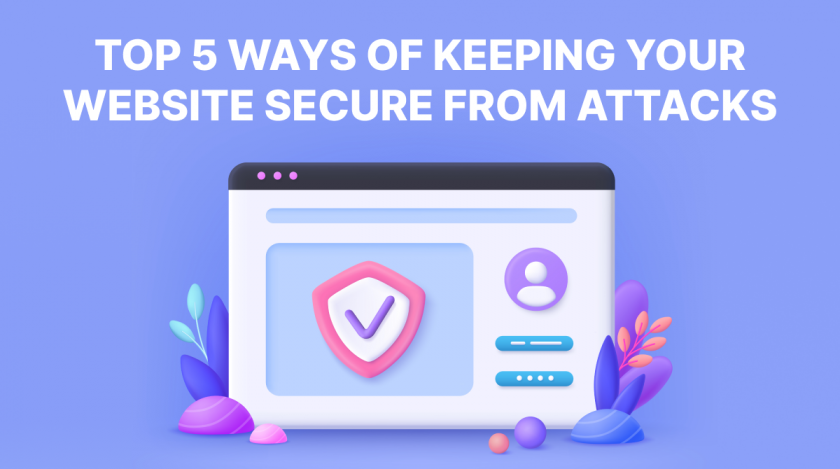Why Does Website Secure Matter?
The threat to your website is greater than you realize. It is quite obvious that to keep a website secure really matters. According to one’s estimates, every single day 30,000 websites are hacked. 64% of the companies worldwide had their website hacked once in the last year.
If someone has hacked your website, you can lose anywhere between hundreds to millions of dollars. That is the best-case scenario. If sensitive user data is stolen, the losses can easily bankrupt you and get you in massive legal trouble. So, unless you don’t mind having your business auctioned and paying millions in damages and lawsuits, having a secure website is the way to go.
Here are the five main measures you can take to ensure you are not the next victim of something like the Acer Ransomware Attack.
Use a Vulnerability Scanner – Website Secure Rule
The way the businessman built websites today needs you to use a lot of third-party and open-source components. These resources are great and make website building easy, but they come with a drawback; you can never be sure of their security status.
The code you develop yourself can also contain vulnerabilities that can create security risks for the website. The solution to this problem is scanning your website for vulnerabilities. You can do it by analyzing every line of the code running your website and manually seeing where a vulnerability might be. But that is not the efficient approach. Not only will it take a lot of time, but things will also still pass through manual scrutiny.
The solution to that is using a vulnerability scanner. These tools can crawl the entire code and point out any vulnerability so that you can fix it. As these are backed by a rich database of known vulnerabilities, the chances of one slipping past them are next to none.
Always Use Credible Hosting Provider
No matter how website secure is in itself, if one doesn’t host it on a secure platform, all that attention to security is pointless. When choosing a hosting service provider for your website, your first consideration should be to look for the security measures taken by the host.
Sure, a secure hosting service will not always be the most economical option out there. But surely, the extra money you spend will be well worth it.
When choosing the hosting service provider, conduct due diligence and go through the reviews previous users have about them.
Keep Up to Date
One of the most common causes of compromised website security is not keeping the website updated. Whether you are using a content management system like WordPress or Joomla or developing a website by writing code, keeping up to date is the key to security.
CMS and programming language vulnerabilities keep surfacing all the time, and once one is detected, it is common knowledge that can be used by anyone to exploit the security of a website.
To make sure you are on top of the security game, install the latest version of the CMS. You can also upgrade to the latest version of the language. So you can ensure that the website is protected against any and all known vulnerabilities.
If you have a simpler website and are not using a CMS but a hosting solution like Squarespace, you don’t need to worry about upgrades. They automatically keep updating in the background, and you are always safe.
Secure the Log in
This seems like an obvious thing, but sadly it is ignored more than we are proud to acknowledge. Using a strong and complex password and username combination is the first and the most important step to keep a website secure.
Keep Updating the Passwords
In the fast-evolving landscape of this age, there’s another thing that you need to be mindful of regarding passwords. Creating a complex password and using it forever is not the solution. You need to change it periodically and make sure that others with administrative privileges also follow this.
Use Two-Factor Authentication
Desirably use two-factor authentication on login. So that even if someone compromised the password, no one can access your website without your authorization. Seeing that online two-factor authorization is vulnerable to hacking, the best option is to use a hardware key for authentication.
Never Use Default Login URL for Website Secure
The next step in securing your login is to never use the default login URL. Again, this is something that goes without saying, yet a lot of people seem to ignore this. Keeping the login URL as www.xyz.com/admin is probably the worst thing you can do to a website from a security point of view. As soon as you set up a website, set the login page to a custom URL. Preferably a randomly generated one.
Sanitize All Input
SQL injection remains one of the most commonly used ways of hacking any online asset, including websites. The best way to protect your website against such an attack is to sanitize anything that enters any of the text or data entry fields on the website. Sanitization makes sure that anything entered into the website does not contain any harmful code that can compromise the website’s security. The three main kinds of sanitization that you can use are:
- Whitelist Sanitizing allows only valid code strings and characters.
- Blacklist Sanitizing cleans the input by removing potentially harmful characters like breaks, extra white spaces, tabs, and tags.
- Escape Sanitizing allows rejecting invalid data requests and striping inputs in order not to be seen as codes.
Conclusion
Websites are an important part of the digital lives we are living. But they carry an obvious risk, one of security. However, if you follow some of the basic guidelines, you can make the website secure against most attacks. Start with using a vulnerability scanner to find out and mitigate known vulnerabilities. Choose a hosting service provider with dependable security measures and keep your website up to date with the latest patches and security updates. Most importantly, secure the login process and sanitize any input that enters the website. You’ll be safe from most cyber attacks.















